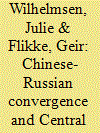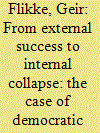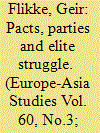|
|
|
Sort Order |
|
|
|
Items / Page
|
|
|
|
|
|
|
| Srl | Item |
| 1 |
ID:
108909


|
|
|
|
|
| Publication |
2011.
|
| Summary/Abstract |
Since the mid-1990s, China's and Russia's strategic outlooks have gradually been converging. The two great powers have incrementally shed their mutual apprehensions and started a comprehensive and multifaceted cooperation in the Shanghai Cooperation Organisation (SCO). Simultaneously, as the rift between the US and Russia has opened up and the differences in their views on regional security in Eurasia have become even more evident, China's and Russia's quests for new models for regional security in Central Asia have gained ground. Enveloping the Central Asian states on issues of collective and energy security, both states are sternly against US dominance in international affairs. In this sense, they have initiated a new geopolitical script around Central Asia. As their mutual interests hold sway over US influence regionally, questions remain on whether specific interests are compatible, or harbour new rivalries. Chinese-Russian interaction in Central Asia reveals that there might be limits to the future expansion of their partnership.
|
|
|
|
|
|
|
|
|
|
|
|
|
|
|
|
| 2 |
ID:
160200


|
|
|
|
|
| Summary/Abstract |
After the 2011–2012 electoral protest cycles, the opportunity structures for a broad range of non-governmental organisations (NGOs) have been narrowed. This essay argues that increased control over NGOs mirrors a deeper conflict of governance models, which is endogenous to the Russian political system, between bureaucratic modernisation and patronal politics. The modernisation sought by the Kremlin under Medvedev’s term brought a greater demand for organisations capable of fulfilling the dual purpose of public communication and state advisory functions. This required clear legal definitions, areas of competence and rules of conduct. However, patronal politics dictate that NGOs should bow to the state, and be governed by diffuse principles of loyalty.
|
|
|
|
|
|
|
|
|
|
|
|
|
|
|
|
| 3 |
ID:
074228


|
|
|
|
|
| Publication |
2005.
|
| Summary/Abstract |
The article discusses the emergence of a Russian version of the Bush doctrine in the Commonwealth of Independent States (CIS) and Russian officials’ conceptual stretching of the strategic culture embodied in the National Security Concept (NSC) and the Military Doctrine (MD) from 2000 onwards. While these documents seem to cherish multilateralism and United Nations (UN) primacy in questions of global and regional security, terrorist attacks on Russia proper have engendered a more assertive approach to regional security issues in the Caucasus and Central Asia and brought Russian officials to consider unilateral pre-emptive strikes against terrorist bases. In the case of the Caucasus, Russia has been striking against terrorist bases on Georgian territory and contributed to constructing a failed state, whereas in the Central Asian case, Russia has sought to revitalise the defunct CIS security framework and pledge assistance to ‘allies’ in the fight against terrorism. The article argues that the war against terrorism has given Russia a new footing in the CIS. The issue of security is more salient, as is the reliance on military force to facilitate it.
|
|
|
|
|
|
|
|
|
|
|
|
|
|
|
|
| 4 |
ID:
058485


|
|
|
| 5 |
ID:
082093


|
|
|
|
|
| Publication |
2008.
|
| Summary/Abstract |
This article resuscitates some of the theoretical arguments of transition studies to shed light on the complex institutional and political developments in post-Orange Ukraine (2004 - 2007). In December 2004, Ukraine's elite agreed to embark on a complex transition involving power-sharing between the Rada (parliament) and the government on one side, and the presidency on the other. The new electoral law was to be based on a fully proportional system. In the subsequent period of 2005 - 2007, two consecutive proportional elections have been held, Ukraine has had several governments, and the Rada was incapacitated for a longer period. Rival elites engaged in a zero-sum game over reforms, and attempts were made to resolve differences by several pacts. This article analyses the post-Orange transition in terms of three variables: the effectiveness of pacts, the need to abide by the transition scheme, and the effect of elections. It is argued that Ukraine has failed to deliver on pacts and timetables, but has delivered on elections. This means that its political system may be considered a minimalist and electoral based one
|
|
|
|
|
|
|
|
|
|
|
|
|
|
|
|
|
|
|
|
|